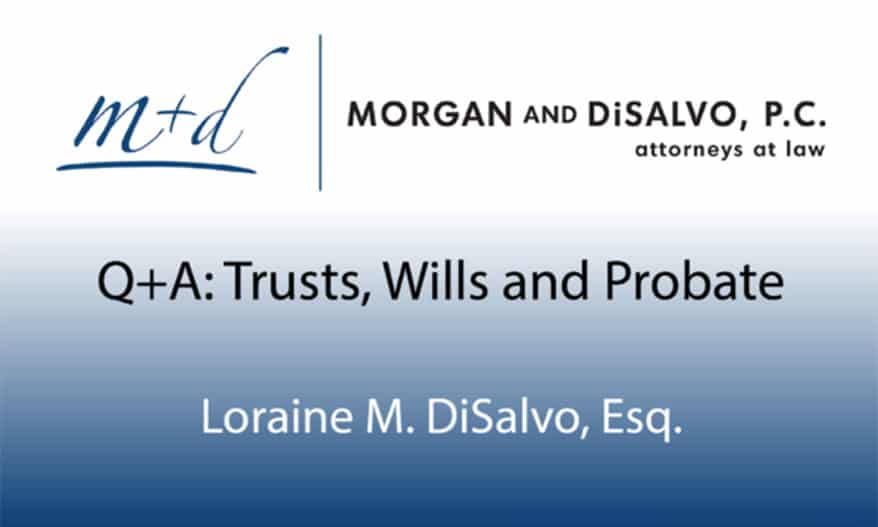Question: My friend, Pete, just lost his mother. He is having a difficult time knowing what to do about her estate because it involves a trust and a Will. There is confusion about which assets belong to the trust and which ones do not. Also, does her Will need to be probated?
Loraine’s Answer: Just because there is a trust does not tell you anything about whether or not a Will needs to be offered for probate. The question is what is in the trust already (or paid directly to the trust or someone else under a beneficiary designation or a right of survivorship) as compared to what, if anything, is contained in the probate estate. Assets will be in the probate estate and create the need for the Will to be probated if Pete’s mother either owned them outright without any beneficiary designation or right of survivorship associated with them, or if her estate was a designated beneficiary. If the trust owned an asset before his mother died, that’s not part of the probate estate; if an asset went directly to another person or to the trust under a beneficiary designation, then it is not part of the probate estate; and if it went to a surviving joint owner under a right of survivorship, it’s not part of the probate estate.
I can’t know from the information given whether there are assets in the probate estate that will require probate or not. However, please note that, in Georgia, if there is a Will and there are any assets that become part of the probate estate other than tangible personal property items such as clothing, furniture, motor vehicles for which the original titles can be found, and other personal items, then the Will must be offered for probate even if the value of the estate is very small. In Pete’s case, this will mean that, if his mother’s probate estate holds any assets, he will likely need to probate her Will in order to address those assets and transfer them to the appropriate beneficiaries. There are no alternative procedures offered in Georgia where there is a Will.
If Pete is 100% certain that there are no assets at all in the probate estate (other than the kinds of tangible personal property items noted above and motor vehicles for which the original titles exist and can be located), then he likely does not have to offer his mother’s Will for probate. However, under Georgia law, he is still required to file the original Will with the appropriate probate court for “Informational Purposes Only.” When he files it, he must be sure to specifically tell the court that the filing is for informational purposes only and that the Will is NOT being offered for probate. There is no cost to file a Will for informational purposes only; however, most probate courts want you submit both the original Will and a certified copy of the death certificate, and it is helpful to the court if you also list the heirs, including their names, their relationships to the decedent, and their addresses. If a Will is filed for informational purposes only, it does not go through probate.
I do sometimes file a Will for informational purposes only on behalf of a client, but it can be done without an attorney’s help. In Pete’s case, if he believes that his mother’s Will must be filed for informational purposes only, he can take or send the original Will and the certified death certificate to the court himself. As noted above, however, he needs to be very clear in telling the court that the Will is being filed for informational purposes only, and NOT for probate.
Pete will still need to administer the trust even if there is no probate needed. I would need to do a consultation to discuss the whole process with you, but the kinds of steps that are generally required in administering a trust include getting a federal EIN for the trust if it does not already have one, reviewing the trust to see what is supposed to happen, and then carrying out the necessary steps from there.
Key Estate Planning Takeaway: Estate plans often involve multiple documents, such as a Will and a trust, and it is not always clear to survivors, fiduciaries, and beneficiaries what needs to be done after your death. Where there is confusion about the various legal documents involved in an estate and what needs to be done with each, the best way for your survivors to gain clarity is to engage an attorney to review the documents and assets with them and help them figure out what steps are needed to properly carry out your planning.
This “Q&A with Loraine” blog series features answers from Morgan + DiSalvo Partner Loraine DiSalvo. A key takeaway highlights an important facet of estate planning.




